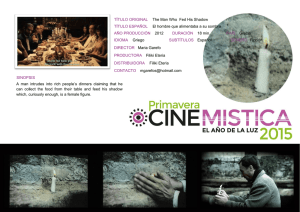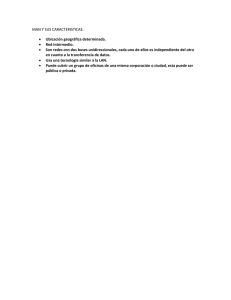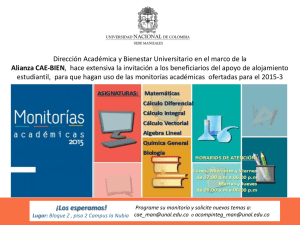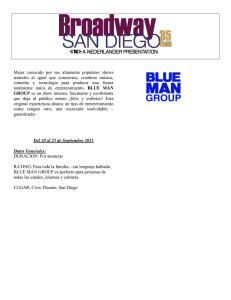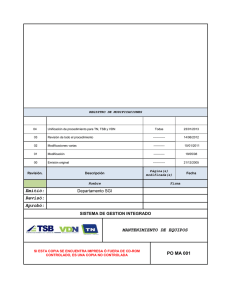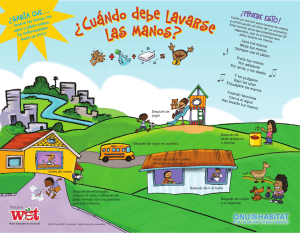September 25, 2016
Anuncio
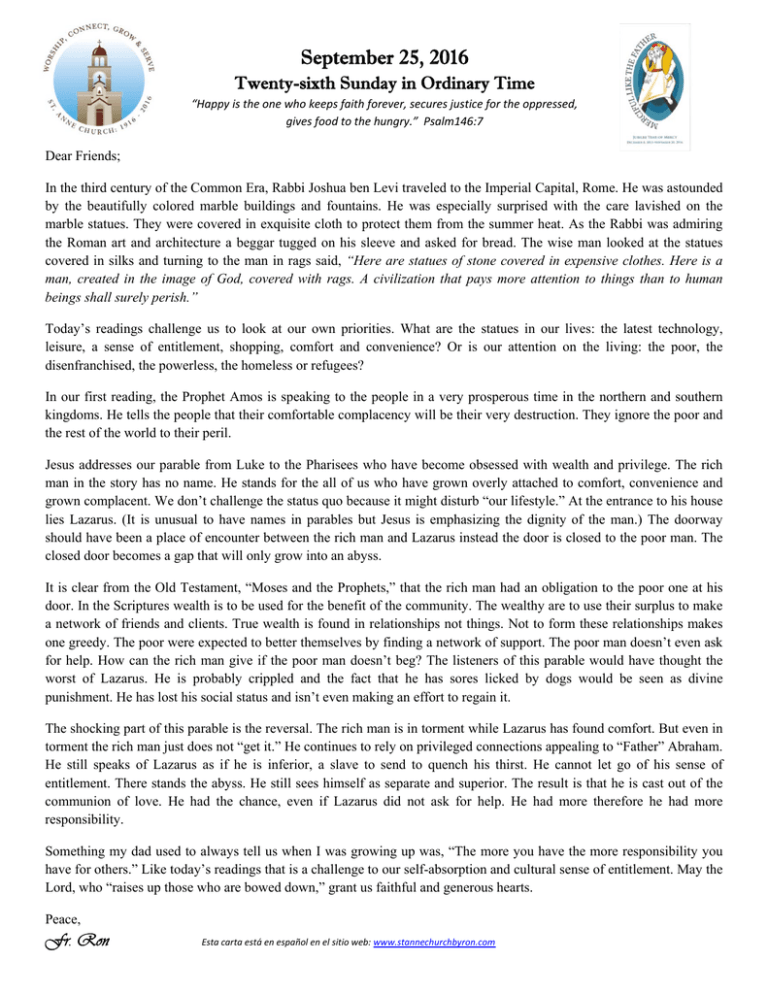
September 25, 2016 Twenty-sixth Sunday in Ordinary Time “Happy is the one who keeps faith forever, secures justice for the oppressed, gives food to the hungry.” Psalm146:7 Dear Friends; In the third century of the Common Era, Rabbi Joshua ben Levi traveled to the Imperial Capital, Rome. He was astounded by the beautifully colored marble buildings and fountains. He was especially surprised with the care lavished on the marble statues. They were covered in exquisite cloth to protect them from the summer heat. As the Rabbi was admiring the Roman art and architecture a beggar tugged on his sleeve and asked for bread. The wise man looked at the statues covered in silks and turning to the man in rags said, “Here are statues of stone covered in expensive clothes. Here is a man, created in the image of God, covered with rags. A civilization that pays more attention to things than to human beings shall surely perish.” Today’s readings challenge us to look at our own priorities. What are the statues in our lives: the latest technology, leisure, a sense of entitlement, shopping, comfort and convenience? Or is our attention on the living: the poor, the disenfranchised, the powerless, the homeless or refugees? In our first reading, the Prophet Amos is speaking to the people in a very prosperous time in the northern and southern kingdoms. He tells the people that their comfortable complacency will be their very destruction. They ignore the poor and the rest of the world to their peril. Jesus addresses our parable from Luke to the Pharisees who have become obsessed with wealth and privilege. The rich man in the story has no name. He stands for the all of us who have grown overly attached to comfort, convenience and grown complacent. We don’t challenge the status quo because it might disturb “our lifestyle.” At the entrance to his house lies Lazarus. (It is unusual to have names in parables but Jesus is emphasizing the dignity of the man.) The doorway should have been a place of encounter between the rich man and Lazarus instead the door is closed to the poor man. The closed door becomes a gap that will only grow into an abyss. It is clear from the Old Testament, “Moses and the Prophets,” that the rich man had an obligation to the poor one at his door. In the Scriptures wealth is to be used for the benefit of the community. The wealthy are to use their surplus to make a network of friends and clients. True wealth is found in relationships not things. Not to form these relationships makes one greedy. The poor were expected to better themselves by finding a network of support. The poor man doesn’t even ask for help. How can the rich man give if the poor man doesn’t beg? The listeners of this parable would have thought the worst of Lazarus. He is probably crippled and the fact that he has sores licked by dogs would be seen as divine punishment. He has lost his social status and isn’t even making an effort to regain it. The shocking part of this parable is the reversal. The rich man is in torment while Lazarus has found comfort. But even in torment the rich man just does not “get it.” He continues to rely on privileged connections appealing to “Father” Abraham. He still speaks of Lazarus as if he is inferior, a slave to send to quench his thirst. He cannot let go of his sense of entitlement. There stands the abyss. He still sees himself as separate and superior. The result is that he is cast out of the communion of love. He had the chance, even if Lazarus did not ask for help. He had more therefore he had more responsibility. Something my dad used to always tell us when I was growing up was, “The more you have the more responsibility you have for others.” Like today’s readings that is a challenge to our self-absorption and cultural sense of entitlement. May the Lord, who “raises up those who are bowed down,” grant us faithful and generous hearts. Peace, Fr. Ron Esta carta está en español en el sitio web: www.stannechurchbyron.com 25 de Septiembre, 2016 Vigésimo Sexto Domingo en Tiempo Ordinario "Feliz es quien mantiene la fe para siempre, asegura justicia para los oprimidos, y da de comer al hambriento". Psalm146:7 Queridos Amigos; En el tercer siglo de la Era Común, El Rabí Joshua Ben Levi viajó a la Capital Imperial, Roma. Él se asombró por los edificios de mármol y fuentes de colores hermosos. Se asombró especialmente del cuidado prodigado que se le daba a las estatuas de mármol. Estaban cubiertos en tela exquisita para protegerlos del calor del verano. Al estar admirando el arte y arquitectura romano, un mendigo tiró de la manga del Rabino y le pidió pan. El sabio miró las estatuas cubiertas de sedas y volviéndose al hombre en harapos dijo: "Aquí están las estatuas de piedra cubierto de ropa cara. Aquí está un hombre, creado a imagen de Dios, cubierto con trapos. Una civilización que presta más atención a las cosas que a los seres humanos seguramente perecerá." Las lecturas de hoy nos desafían a mirar nuestras propias prioridades. ¿Cuáles son las estatuas en nuestra vida: la última tecnología, el ocio, el sentido de derechos, las compras, el confort y la comodidad? ¿O es la atención a los que esta en vida: los pobres, los marginados, los débiles, desamparados o refugiados? En la primera lectura, el profeta Amos habla a la gente en una época muy próspera en los reinos del norte y del sur. Le dice al pueblo que su complacencia cómoda será su propia destrucción. Ignoran los pobres y al resto del mundo a su riesgo. Jesús hace mención de la parábola de Lucas a los Fariseos que se han obsesionado con la riqueza y el privilegio. El hombre rico en la historia no tiene nombre. Él está para todos nosotros que nos hemos encariñado demasiado con la comodidad, conveniencia y nos hemos hecho complaciente. No desafiamos el statu quo porque quizá perturbe "nuestro estilo de vida." En la entrada de su casa se encuentra a Lázaro. (Es inusual tener nombres en parábolas, pero Jesús está poniendo énfasis en la dignidad del hombre). La puerta de entrada debería haber sido un lugar de encuentro entre el hombre rico y Lázaro, en su lugar se le cierra la puerta al pobre hombre. La puerta cerrada se convierte en un vacío que sólo se convertirá en un abismo. Es claro en el Antiguo Testamento, "Moisés y los profetas," que el hombre rico tenía una obligación al pobre en su puerta. En las escrituras, la riqueza es para ser utilizada en beneficio de la comunidad. Los ricos deben utilizar sus excedentes para hacer una red de amigos y clientes. La verdadera riqueza se encuentra en las relaciones no en las cosas. El no formar estas relaciones nos hace codiciosos. Se esperaba que los pobres debieran mejorarse encontrando una red de apoyo. El pobre ni siquiera pide ayuda. ¿Cómo puede el hombre rico darle algo si el pobre hombre no mendiga? Los oyentes de esta parábola hubieran pensado lo peor de Lázaro. Él probablemente es lisiado y el hecho de que tiene llagas lamidas por perros significaría que sería visto como castigo divino. Ha perdido su status social y aún no está haciendo un esfuerzo por recuperarlo. La parte sorprendente de esta parábola es la revocación. El hombre rico está atormentado, mientras que Lázaro ha encontrado serenidad. Pero incluso en su tormento el rico simplemente “agarra la onda” Continúa dependiendo de las conexiones privilegiadas apelando a “el Padre” Abraham. Todavía habla de Lázaro como si fuera inferior, un esclavo para enviar a saciar su sed. No puede deshacerse de su sentido de derecho. Allí se encuentra el abismo. Él todavía se ve a si mismo como separado y superior. El resultado es que él es echado fuera de la comunión de amor. Tuvo la oportunidad, incluso si Lázaro no pidió ayuda. Él tenía más, por lo tanto tenía más responsabilidad. Algo mi papá siempre nos decía cuando estaba creciendo era, "en cuanto más tienes, más responsabilidad tienes por los demás". Como las lecturas de hoy es un reto a nuestro ensimismamiento y sentido cultural del derecho. Que el Señor, que "eleva a aquellos que se inclinaron," Nos de corazón fiel y generoso. Paz, Fr. Ron Esta carta está en español en el sitio web: www.stannechurchbyron.com
